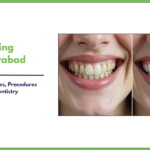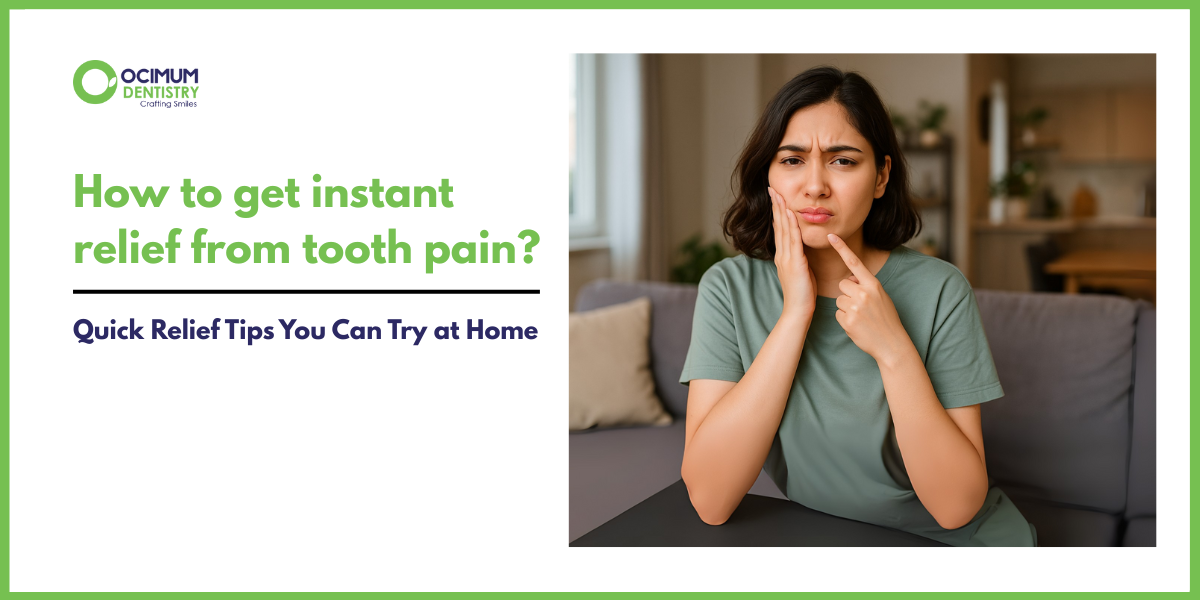Toothache SOS: How to Get Instant Relief with These Simple Tips.
Tooth pain rarely gives a warning. It can strike suddenly—in the middle of the night, during meals, or right before an important day. Whether it’s a dull ache or sharp, shooting pain, one thing is clear: it needs attention—and fast.
At Ocimum Dentistry, Jubilee Hills, Hyderabad, we regularly help patients dealing with sudden dental pain. While professional treatment is the only long-term solution, some safe, science-backed home remedies can offer temporary relief.
Toothache in India: A Rising Urban Concern
In cities like Hyderabad, changing food habits, high stress, and skipped dental visits are contributing to a noticeable rise in toothache cases.
According to the Indian Council of Medical Research (ICMR), around 42% of adults in India experience tooth pain at some point, but over 60% delay dental visits, choosing to self-treat with painkillers or home remedies instead.
(Source: ICMR-National Oral Health Survey & Fluoride Mapping 2002–2003 and updates from the Ministry of Health & Family Welfare, Govt. of India)
But tooth pain is rarely random. It’s often a warning sign—of decay, infection, or nerve involvement. The earlier it’s treated, the simpler (and less expensive) the treatment.
Common Causes of Sudden Tooth Pain
Toothaches can stem from a wide range of problems. At our clinic in Jubilee Hills, we most often see:
- Tooth Decay (Cavities): Pain begins when decay reaches the inner layers of the tooth.
- Gum Infections or Abscess: Localized swelling and pus can lead to sharp or throbbing pain.
- Cracked Tooth or Fracture: Even a small crack can expose nerves and cause sensitivity.
- Tooth Grinding (Bruxism): Often worsened by stress, this habit leads to jaw and tooth pain.
- Wisdom Tooth Pain: Pain from impacted or infected wisdom teeth is common in young adults.
- Sinus-Related Tooth Pain: Sinus infections can create pressure in upper jaw teeth.
Quick Relief Tips You Can Try at Home (And Why They Work)
Toothaches can make even basic things feel unbearable. While professional care is the solution, here are science-backed home remedies, including Tulsi, that may help ease your discomfort temporarily.
Salt Water Rinse
Salt is a natural antiseptic that helps reduce bacteria, clean the affected area, and soothe inflammation.
Source: Indian Journal of Dental Research, 2011
How to Use: Mix 1 teaspoon of salt in warm water and rinse for 30 seconds. Repeat 2–3 times a day.
Note: Do not swallow the rinse. Avoid overuse if you have high blood pressure.
Cold Compress
Cold helps by numbing the area and reducing swelling by narrowing blood vessels.
Source: American Dental Association (ADA)
How to Use: Wrap ice in a clean cloth and apply it to the cheek near the painful area for 15 minutes.
Note: Never apply ice directly to the skin or tooth—it can worsen sensitivity.
Clove Oil
Clove contains eugenol, a natural anesthetic and antimicrobial agent used for centuries.
Source: Journal of Natural Science, Biology & Medicine, 2010
How to Use: Soak a cotton ball in clove oil and gently place it near the painful tooth for 5–10 minutes.
Note: Use sparingly; excessive use may irritate soft tissues.
Common pain relief medicines
Pain relievers like ibuprofen reduce inflammation and control pain signals.
Source: Indian Dental Association (IDA), 2023 Guidelines
How to Use: Take as directed on the label. Usually 400 mg ibuprofen provides relief for 4–6 hours.
Note: Do not take without food. Avoid if you have ulcers, asthma, or kidney issues without consulting a doctor.
Hydrogen Peroxide Rinse (Diluted)
Helps kill bacteria and reduce symptoms of gum infections.
Source: Journal of Clinical and Diagnostic Research (JCDR), 2016
How to Use: Mix 3% hydrogen peroxide with equal water. Swish for 30 seconds and rinse thoroughly with plain water.
Note: Do not swallow. Use only 2–3 times a week and avoid if you have open wounds or mouth ulcers.
Tulsi (Holy Basil) Paste or Leaves
Tulsi has antimicrobial and anti-inflammatory properties, effective against oral bacteria.
Source: International Journal of Ayurveda Research, 2010
How to Use: Crush Tulsi leaves into a paste and apply it on the affected area, or chew 2–3 fresh leaves.
Note: Use fresh leaves. Do not substitute with dried powders or packaged tulsi extracts unless advised by a doctor.
Avoid Hot, Cold, or Sugary Foods
These can trigger tooth nerves, especially in cases of decay or exposed dentin.
Source: National Institute of Dental and Craniofacial Research (NIDCR)
What to Eat: Choose lukewarm foods like soft rice, curd, bananas, or dal.
Note: Avoid biting from the painful side and stay away from sticky, acidic, or crunchy foods.
When to See a Dentist Immediately
These signs mean home remedies aren’t enough:
- Pain lasting longer than 24–48 hours
- Swelling of gums or jaw
- Pus, bad taste, or foul smell in the mouth
- Fever or chills
- Pain that worsens while lying down
These may point to deep decay, infection, or nerve involvement, and need immediate dental care.
Tooth Pain Treatment at Ocimum Dentistry, Jubilee Hills
We offer same-day appointments and gentle care for patients in pain. Here’s how we handle urgent toothaches:
- Digital X-rays and diagnostic imaging
- Temporary fillings or gum drainage if needed
- Pain relief through medication or topical numbing agents
- Long-term care like fillings, crowns, or root canal therapy
Whether it’s a small cavity or a deeper issue, we work to stop the pain and prevent future problems.
FAQs About Tooth Pain Relief
Q1. Will clove oil cure the pain?
It can reduce the pain for a short time, but it won’t treat the underlying cause. You still need to see a dentist.
Q2. Can I ignore pain if it stops on its own?
No. Pain that fades may return worse. It usually means the nerve is damaged or infected.
Q3. Should I keep taking painkillers daily?
Only short-term. Painkillers mask symptoms but don’t treat the issue.
Q4. How do I know if I need a root canal?
If pain lingers after cold/hot food, disturbs your sleep, or spreads to the jaw—these may be signs.
Get Relief from Tooth Pain—Today
You don’t have to live with pain—or rely only on temporary fixes.
At Ocimum Dentistry, Jubilee Hills, we’re here to help you feel better now—and protect your smile long-term.
Call us or book online today for expert toothache treatment in Jubilee Hills ,Hyderabad.





